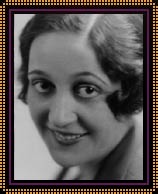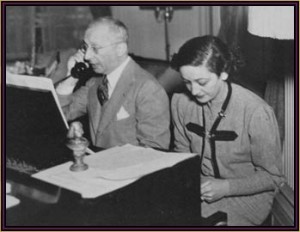 Fields, Dorothy (July 15, 1905 – Mar. 28, 1974), lyricist and librettist, was born in Allenhurst, N.J., the daughter of Lew M. Fields and Rose Harris. Her father, born Lewis Maurice Schoenfeld, was famous as a member of the comedy duo Weber and Fields, but left performing in the year of Dorothy’s birth to become a successful Broadway impressario. Although Lew Fields cautioned his children against pursuing careers in the theater, Dorothy’s two older brothers, Joseph and Herbert, also became successful on Broadway, the former as a writer and producer, and the latter as a writer and Dorothy’s sometime collaborator.
Fields, Dorothy (July 15, 1905 – Mar. 28, 1974), lyricist and librettist, was born in Allenhurst, N.J., the daughter of Lew M. Fields and Rose Harris. Her father, born Lewis Maurice Schoenfeld, was famous as a member of the comedy duo Weber and Fields, but left performing in the year of Dorothy’s birth to become a successful Broadway impressario. Although Lew Fields cautioned his children against pursuing careers in the theater, Dorothy’s two older brothers, Joseph and Herbert, also became successful on Broadway, the former as a writer and producer, and the latter as a writer and Dorothy’s sometime collaborator.
Dorothy Fields graduated in 1923 from the Benjamin Franklin School for Girls in New York City, where she excelled at English, drama, and basketball, and had her poems published in the school’s literary magazine. After her father quashed her attempt to land an acting job with a stock company in Yonkers, she worked as a teacher and laboratory assistant, while continuing to submit her verses to magazines.
Dorothy Fields
- "Annie Get Your Gun"
- "Blackbirds of 1928"
- "Redhead"
- "Sugar Babies"
- "Sweet Charity"
- "Up in Central Park"
- Harold Arlen
- Fred and Adele Astaire
- Irving Berlin
- Bob Fosse
- Oscar Hammerstein II
- Jerome Kern
- Ethel Merman
- Cole Porter
- Richard Rodgers
- Gwen Verdon
In 1927 Fields received sole billing as lyricist for a revue at Harlem’s Cotton Club that featured Duke Ellington and his Orchestra. The following year she and McHugh wrote the song “I Can’t Give You Anything but Love,” which was dropped from the revue “Revels of 1928,” but found a home alongside another soon-to-be-popular Fields-McHugh number, “Diga Diga Doo,” in the all-black hit, Lew Leslie’s “Blackbirds of 1928.”
After this initial success, the Fields-McHugh team collaborated on “International Revue” (1930), a flop despite two enduring songs, “Exactly Like You” and “On the Sunny Side of the Street.” The family of jazz pianist Thomas (“Fats”) Waller maintained that Waller, not McHugh, actually composed the melodies to “On the Sunny Side of the Street,” “I Can’t Give You Anything but Love,” and others, and sold them to McHugh for a nominal fee. In any case, however, it is undisputed that Fields is the lyricist.
From 1930 to 1939 Fields worked in Hollywood, first with McHugh, with whom she wrote songs such as “I’m in the Mood for Love” and “Dinner at Eight” for the movie musicals LOVE IN THE ROUGH (1930) and EVERY NIGHT AT EIGHT (1935), and then with Jerome Kern. Kern and Fields first worked together on ROBERTA in 1935, and subsequent collaborations included I DREAM TOO MUCH (1935), SWING TIME (1936), and JOY OF LIVING (1938). In 1936, Kern and Fields won the Academy Award for Best Song for “The Way You Look Tonight,” from SWING TIME. Other Kern-Fields songs from this period that have gone on to become standards include “Lovely to Look At” and “A Fine Romance.”

Jerome Kerns and Fields collaborated on songs for movie musicals during the 1930s.
In 1946, Fields approached Oscar Hammerstein with her idea for a musical based on the life of sharpshooter Annie Oakley. Hammerstein agreed to produce the show, and Kern and Fields were contracted to write the songs. When Kern died before they were able to begin work on the project, Irving Berlin was hired to replace him. Berlin wrote both music and lyrics for “Annie Get Your Gun,” but Dorothy and Herbert Fields contributed an excellent book. The finished product, starring Ethel Merman as Annie, ran 1,147 performances. It remains one of the most popular shows in the repertoire.
Fields’ work habits were highly disciplined. Typically, she would spend eight weeks researching, discussing, and making notes on a project, before settling into an 8:30 A.M. to 4:00 P.M. daily work routine. She worked at a bridge table in her apartment on the Upper West Side of Manhattan, and preferred to write with pencil on a yellow legal pad. She kept notebooks in which she copied passages from Dryden, Shaw, and Thoreau; unusual synonyms for commonly used words; humorous proverbs; rhyming phrases; odd-sounding words; and anything else that might come in handy in writing a lyric. Tall, slender, and well dressed, with chestnut hair and hazel eyes, she spoke well and was active in charitable causes throughout her life.
Fields collaborated with her brother and composer Morton Gould on the lackluster “Arms and the Girl” in 1950. The following year, she wrote several fine lyrics to Arthur Schwartz’s melodies for “A Tree Grows in Brooklyn.” She scored two films with composer Harold Arlen, MR. IMPERIUM (1951) and THE FARMER TAKES A WIFE (1953), then returned to Broadway to work with Schwartz again on “By the Beautiful Sea” (1954). Herbert Fields died in 1959, while “Redhead,” the show they were working on with composer Albert Hague, was having its out-of-town tryout. Although not a great show, “Redhead” captured the Tony Award for Best Musical in a lean year for Broadway theater.
Her penultimate musical, “Sweet Charity,” written with composer Cy Coleman and librettist Neil Simon, was the biggest hit of the 1965-1966 season. Songs such as “Big Spender” and “If My Friends Could See Me Now” proved that Fields, despite her advancing age, had not lost her knack for up-to-the-minute slang and phraseology. In 1971, Fields became the first woman inducted into the Songwriters Hall of Fame. Her last show, “Two for the Seesaw” (1973), also written with Coleman, was not a popular success, but her lyrics were praised for their evocation of modern life in New York. She died at home in New York City.
During her 48-year career Fields cowrote more than 400 songs and worked on 15 musicals and at least 26 movies. Her lyrics were noted for their strong characterization, clarity of language, and middlebrow humor. An amateur pianist and lifelong lover of classical music, she was highly conscious of the melodic line, and tailored her lyrics to float freely over it. Fields’ professional longevity, rare for a songwriter in the popular field, may be attributed to her undimming imagination and her willingness to adapt to changing trends in the musical theater.
— Gregory Robinson
Source: Excerpted from DICTIONARY OF AMERICAN BIOGRAPHY, SUPPLEMENT 9: 1971-1975, Charles Scribner’s Sons, © 1994 Charles Scribner’s Sons. Reprinted by permission of The Gale Group.
Photo credits: Photofest and the Library of Congress

